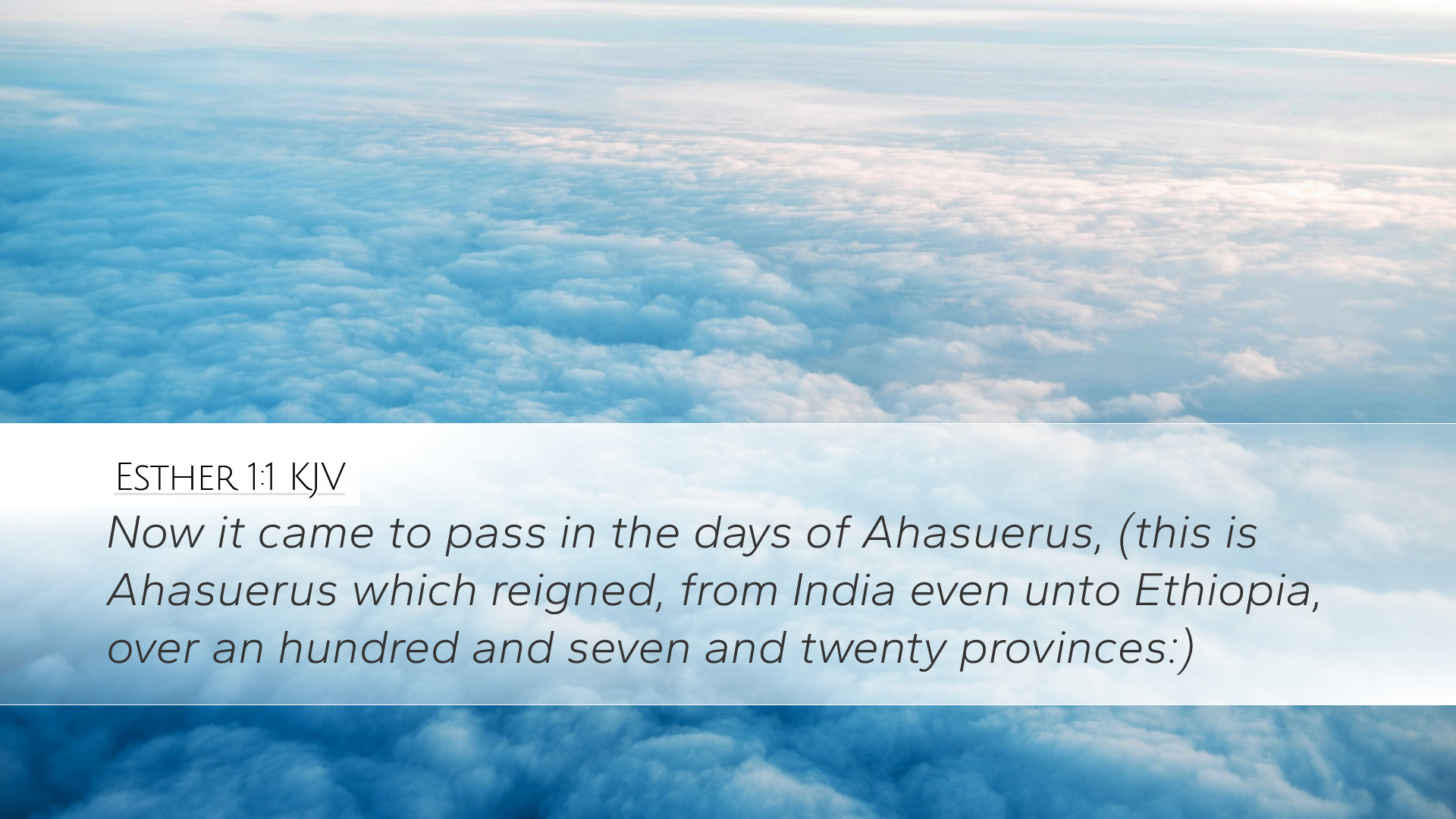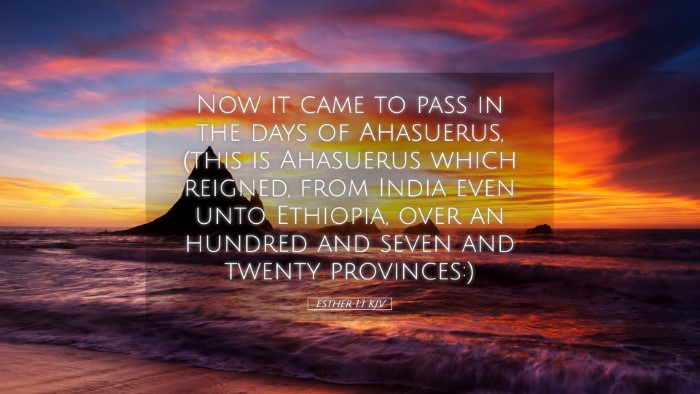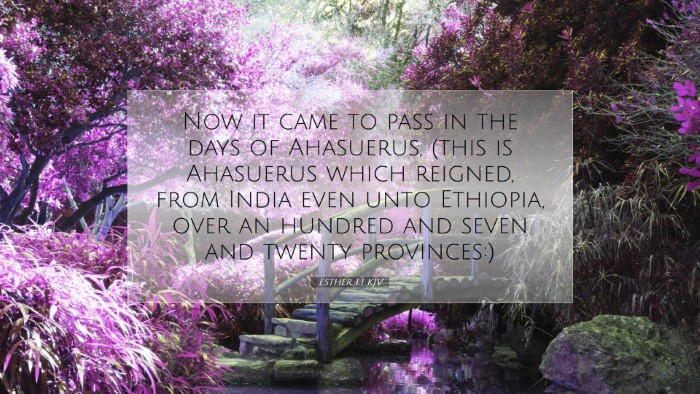Old Testament
Genesis Exodus Leviticus Numbers Deuteronomy Joshua Judges Ruth 1 Samuel 2 Samuel 1 Kings 2 Kings 1 Chronicles 2 Chronicles Ezra Nehemiah Esther Job Psalms Proverbs Ecclesiastes Song of Solomon Isaiah Jeremiah Lamentations Ezekiel Daniel Hosea Joel Amos Obadiah Jonah Micah Nahum Habakkuk Zephaniah Haggai Zechariah MalachiEsther 1:1
Esther 1:1 KJV
Now it came to pass in the days of Ahasuerus, (this is Ahasuerus which reigned, from India even unto Ethiopia, over an hundred and seven and twenty provinces:)
Esther 1:1 Bible Commentary
Bible Commentary on Esther 1:1
Esther 1:1 states: "Now it came to pass in the days of Ahasuerus, this is Ahasuerus which reigned from India even unto Ethiopia, over an hundred and twenty-seven provinces." This verse introduces the context and setting for the Book of Esther, highlighting the historical and geographical scope of the reign of King Ahasuerus. Below is a combined commentary based on insights from public domain sources, providing spiritual and theological reflections for pastors, students, theologians, and scholars.
Context and Historical Significance
The reign of Ahasuerus, commonly identified with Xerxes I of Persia, represents the zenith of Persian power and influence. Matthew Henry emphasizes that "the setting of this book within the vast empire reflects the impressive reach of the Persian monarch." The mention of his dominion "from India even unto Ethiopia" (or Cush) signifies not only a geographical but also a cultural and political dominion that will play a crucial role in the unfolding narrative.
The Empire's Extent
According to Albert Barnes, the extent of the empire underscores "the immense wealth and power that Ahasuerus wielded." This vast dominion serves as a backdrop to the story of Esther and provides insight into the scale of the events that will transpire. The regions mentioned—spanning the breadth of two great civilizations—are symbolic of the diverse influences and challenges facing the Jewish people during their exile.
Theological Reflections
From a theological perspective, Adam Clarke observes that the expansion of Ahasuerus's kingdom symbolizes God’s providential oversight. The historical context set by this verse serves to highlight God's sovereignty over nations and rulers, establishing an essential theme in the narrative of Esther—that of divine providence working through human affairs to fulfill His purposes.
Divine Providence and Human Authority
This verse sets the stage for viewing the characters within the narrative not merely as individuals making choices but as instruments of God's overarching plan. It is a reminder to readers and leaders that God can orchestrate events through worldly authorities, as seen throughout Scripture. Clarke notes, "The Book of Esther illustrates how divine providence often operates through seemingly secular circumstances." This invites pastors to consider the breadth of God’s work, even amidst what may appear to be chaotic political landscapes.
Applications for Leadership
Pastors and leaders can glean several lessons from this opening verse regarding leadership and stewardship. Ahasuerus's reign, while expansive and impressive, is a reminder of the responsibility that comes with authority. Matthew Henry points out that "leaders will be judged by how they govern those entrusted to their care." This highlights the importance of humility, integrity, and accountability in leadership.
Lessons on Authority
- Responsibility of Leadership: Ahasuerus's power calls leaders to reflect on their responsibility to their constituencies.
- Accountability to God: The sheer scale of his empire does not exempt Ahasuerus from moral or spiritual accountability.
- Servanthood in Leadership: True authority reflects servanthood, aligning with Christ’s example as seen in Mark 10:42-45.
Cultural Insights
Understanding the multicultural essence of the Persian Empire is vital for appreciating the Book of Esther's narrative. This verse sets a tone that reflects the pluralistic society in which the Jews found themselves. Albert Barnes notes that "this helps readers comprehend the distance Esther must traverse from her identity as a Jewish woman to navigate the intricacies and dangers posed by an alien culture." This calls for a nuanced understanding of cultural engagement without compromising one’s identity or faith.
Cultural and Spiritual Duality
The juxtaposition between Jewish identity and the cultural norms of Persia prompts valuable reflections on how contemporary believers navigate a multicultural environment. The verse serves as a backdrop for exploring themes of assimilation, integrity, and faithfulness amidst external pressures. It is crucial for theological discourse to address how believers can maintain their witness in diverse cultures while remaining faithful to scriptural convictions.
Conclusion
Esther 1:1 encapsulates themes of power, authority, cultural complexity, and divine providence. This introductory verse is not just a historical statement but a theological foundation that invites deeper reflection on God’s sovereignty and the intricacies of His plans. For pastors, students, and theologians, this text encourages an exploration of how faith interacts with culture and leadership, ultimately illustrating that God is always at work, even in the hearts of powerful rulers.
As we delve deeper into the Book of Esther, let us remain mindful of the themes that arise from the very first verse, drawing parallels to our own contexts and seeking to embody the faithfulness that characterized Esther and her people.


